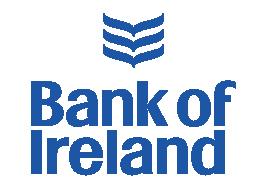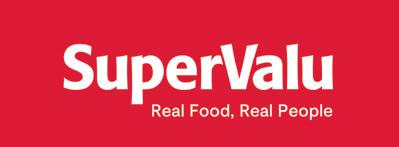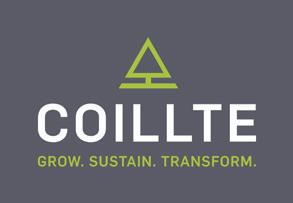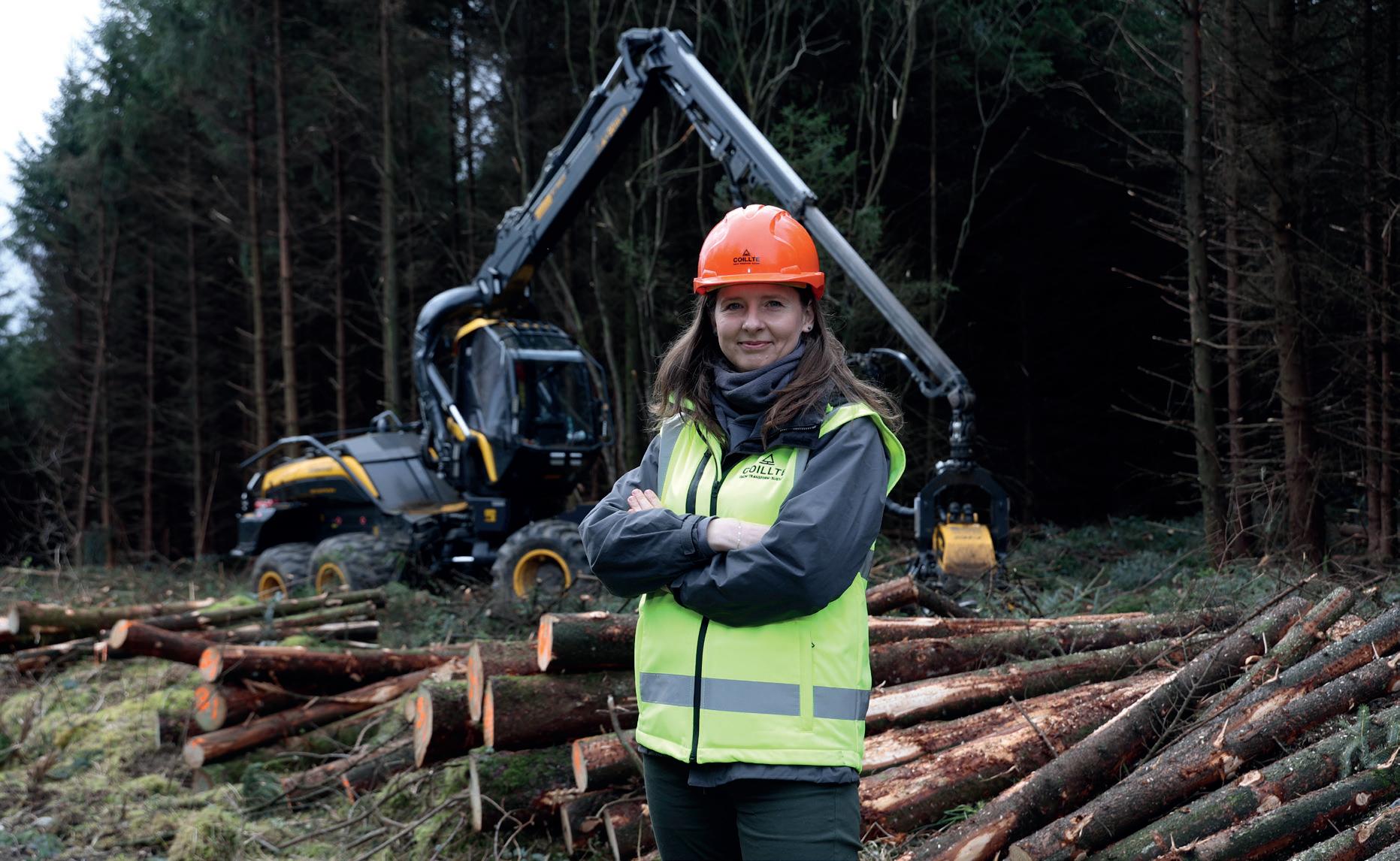Career Transformation
“STEM
 Claire Farrugia, Assistant Editor, gradireland Page
Claire Farrugia, Assistant Editor, gradireland Page
“The most successful roadmaps begin with adopting a positive mindset.”

 Gina Oglesbey, Founder & CEO, Back to Work Connect Page 06
Gina Oglesbey, Founder & CEO, Back to Work Connect Page 06

Q1 2023 | A promotional supplement distributed on behalf of Mediaplanet, which takes sole responsibility for its content
related skills are likely to remain in high demand for roles in the sector.”
02
www.businessnews.ie
What are the hard and soft skills you need to succeed in the tech industry?
Ireland is a global leader in technology, but as the sector begins to feel the pinch with job cuts, how can you position yourself to succeed as a graduate in this industry?
The challenges facing the technology sector globally have real consequences for Ireland, on both the macro and micro economic scale. These have led to ongoing cuts across the sector.
Impact of job cuts
In terms of job cuts themselves, Irish workers have been only modestly affected, although that is of no comfort to the many Irish employees who have lost their jobs in 2022 and 2023 at many household-name tech companies. The sector employs more than 250,000 people throughout the country.
One silver lining is that although many companies are shedding jobs in certain areas, many continue to recruit in other areas, and the pace of job cuts has slowed in recent weeks.

Job opportunities for graduates
STEM (science, technology, engineering and maths) related skills are likely to remain in high demand for roles in the sector, in organisations such as:
• Major technology services
• Technology solutions
• Mobile technology and services
• Insurance
• Financial technology (fintech)
• Software and game development
Demand for hard skills
While there’s more to a successful technology career than just hard or technical skills, they are the bedrock for many of the most in-demand roles. The suite of programming and coding languages continues to expand, but among those most in demand are Java, C#, .NET, Python, C++
and HTML 5. Graduates with an understanding of digital design and UX (User Experience) testing and refinement will also be in demand, particularly those with project or experience-based work in their portfolios.
The value of soft skills
While technical skills may be the bread and butter of entering tech, it’s not all you need. This is a very collaborative industry, and people skills are highly important.
Technology graduates may also be competing against jobseekers from more soft skills-focused disciplines such as social science or humanities. The main soft skills tech companies value include:
• Communication
• Ability to plan, organise and communicate plans
• Drive, enthusiasm and resilience
• Problem-solving and creative thinking
• Working effectively as part of a team and developing the ability to lead
These skills are particularly crucial in more people-focused roles such as consulting — where communication, problem-solving and commercial awareness are to the fore. It’s best to be conscious of all the skills that can help you succeed in the industry.



02 READ MORE AT BUSINESSNEWS.IE AN INDEPENDENT SUPPLEMENT FROM MEDIAPLANET WHO TAKE SOLE RESPONSIBILITY FOR ITS CONTENT MEDIAPLANET
Project Manager: Cian Fitton cian.fitton@mediaplanet.com Business Development Manager: Lucy Harris Managing Director: Alex Williams Head of Ireland: Ross Bannatyne | Head of Print & Design: Thomas Kent Designer: Aimee Rayment Content Editor: Angelica Hackett O’Toole | Head of Digital Operations: Harvey O’Donnell Paid Media Manager: Jonni Asfaha Social & Web Editor: Henry Phillips Digital Assistant: Carolina Galbraith Duarte All images supplied by Gettyimages, unless otherwise specified @BusinessnewsIE Contact information: uk.info@mediaplanet.com or +44 (0) 203 642 0737 @MediaplanetUK Please recycle Claire Farrugia
Editor,
IN THIS ISSUE
Assistant
gradireland
Gina
“Remember that returning to work will be a learning curve.”
Oglesbey Founder & CEO, Back to Work Connect
Page 06
“The demand for skills is outpacing supply.”
Claire
McGee Head of Education and Innovation and Policy, IBEC
Page
10
“Skills are developed through life experiences just as much as through work.” Julianne Miles CEO and Co-Founder, Women Returners Darina Mulligan Lead Coach Ireland, Women Returners
Page 08
Career growth and engineering talent valued in Ireland’s ambitious sector
By continuing to invest in engineering teams and nurturing existing talent, companies can build a strong foundation for their continued success.
With over 25 years of experience, H&MV Engineering is a global provider of Specialist Design, Engineering and Construction Services across key sectors including data centres, renewable energy, transmission and distribution utilities, globally.
Nurturing engineering talent with skills initiatives David Maher, Managing Director, Ireland says: “Investing in and nurturing talent is very much part of our culture and is evidenced by our talent and skills initiatives such as our high voltage apprentice development programme and engineering graduate programmes.”
The company’s tailored Apprentice Development programme is designed to provide apprentices with the ideal

forum to learn and develop the skills and knowledge required within the high voltage specialist industry through mentoring, encouragement and assessment.
“I’ve had a hugely fulfilling career to date, starting out with an electrical apprenticeship which has been the foundation for my career progression. It gave me the opportunity to learn key skills while gaining an understanding of the industry which has also been a pathway to continue my journey in education,” says Maher.
Continuous learning for engineering staff
The commitment to staff’s individual evolution and personal development is continually reinforced and evidenced by strong internal progression and promotion initiatives. “As a people-first, value-led business, we
aim to develop our employees’ skills and abilities, allowing them to reach their full potential,” says Maher, who is currently completing a Masters (MSc) in Business at UCD Michael Smurfit Executive Development.
“My hope to continue cultivating our employees skillsets with a dedicated focus on continuous improvement, sustainability and safety, while working in an open, enjoyable atmosphere.”
Growth for every person and part of the business
H&MV Engineering currently employs more than 500 people throughout Europe, Asia, Africa and the Middle East and is continually recruiting Ireland’s best and brightest — with the unique opportunity to further their careers in Ireland’s niche specialist engineering industry as well as emerging growth sectors such as Offshore Wind and Biofuel Generation.
As part of the senior management team leading H&MV Engineering into the next 25 years, Maher concludes by adding: “Our leadership team are fantastic advocates of personal development for all in H&MV, continuing to ensure the growth and innovation within the organisation, from the CEO to the newest apprentice.”
David Maher Managing Director Ireland, H&MV
Helping more people grow and advance their careers in retail
Offering employees a range of career journeys and internal development opportunities can prove invaluable in retaining loyal and motivated colleagues within the retail sector.
Retail experts highlight the value of recruiting employees from various backgrounds to deliver a workforce that can best relate to the customer base. Applegreen, Head of HR, Jean Marten emphasises how different entry options into retail and an array of career development strategies ensure individuals meet their aspirations.
Career opportunities for all
With a diverse customer demographic, Marten says having colleagues from a broad range of backgrounds is instrumental to the success of a customer-centric business.
Katie Dunne, Applegreen’s Early Careers Manager, responsible for the company’s internship and retail graduate programmes, outlines how their retail and finance graduate programmes see participants rotating between departments to offer “a holistic view of the business.”
“It works for us and for those coming out of university who aren’t 100% sure about what part of the business they are most interested in.” Retail graduates receive accredited diplomas, while accounting and finance graduates are supported to become ACCA-accredited.
WRITTEN BY Mark Nicholls
“Our colleagues are immersed in the communities they work in — they know our customers,” she says. “They listen to their needs and wants, to continue to enhance their customer experience. If we hire people who are passionate about customer experience, it keeps us abreast of what the market wants.”
Marten is Head of HR (Retail Operations Ireland) for roadside retailer Applegreen, which operates across Ireland, the UK and the United States.



Pointing to a workforce with 60+ different nationalities, she says the company offers flexible career paths for people of different ages, mindsets or aspirations. “One size does not fit all,” she adds.
How to retain employees
Diversity can also help with employee retention, particularly with the company undergoing a period of rapid growth and transformation as consumer needs change.
Training opportunities
Other training programmes include QQI-accredited leadership programmes; City & Guilds accredited barista and customer service programmes; a 2-year apprenticeship programme; a 3-year retail degree programme; alongside a suite of other tailored management development programmes.
“We are very passionate about internal succession,” adds Marten. Such pathways have, for example, seen an individual who joined as a maintenance employee advance to a retail director position; a deli worker who had moved from Lithuania to become a regional manager; and an intern progress to become executive assistant to senior company directors.
Marten emphasises the global opportunities within Applegreen, pointing to managers who have relocated from Ireland to drive the US arm of the business.

MEDIAPLANET READ MORE AT BUSINESSNEWS.IE 03 AN INDEPENDENT SUPPLEMENT FROM MEDIAPLANET WHO TAKE SOLE RESPONSIBILITY FOR ITS CONTENT
Find out more at hmv engineering.com Paid for by H&MV
Katie Dunne Early Careers Manager, Applegreen
Find out more at applegreen stores.com
Jean Marten Head of HR, Retail Operations Ireland, Applegreen
Paid for by Applegreen
Neurodiversity encourages new and varied ways of thinking, which can be value-adding for businesses and individuals. Empowering neurodiverse employees in the workplace enables growth.
Nick, a talented I.T. graduate who has autism was struggling to find his first job when he reached out to Specialisterne Ireland (SPI). The company understood Nick’s needs and worked directly with SAP, an I.T. company in Dublin, to break down the barriers making finding employment difficult for Nick.
Helping people succeed
Nick is now celebrating his 9th year working in SAP, and his career continues to flourish.
“I’ve bought my own house near to where I work and walk in every day. When I started out in my career as an autistic graduate, I never thought I would be able to achieve that goal. Specialisterne Ireland was a big part of that success,” says Nick.
Empowering neurodivergent individuals
Specialisterne Ireland is a specialist recruitment consultancy, established by three people with autistic children, including the current CEO, Peter Brabazon. They set up the company to support people like their autistic sons who, like Nick, were also facing challenges in finding employment that suited their interests and needs.

The company has just celebrated its 10th anniversary having supported more than 1,000 talented neurodivergent individuals to move closer to gaining and retaining employment. They work with autistic candidates, as well as those with ADHD, dyspraxia and dyslexia. They use a candidate-centric, strengths-based approach, matching the talents, skills and interests of candidates to an opportunity in one of their 50 partner companies.
SAP and the three main banks are among the many partners who have expressed the value in having the SPI team to call upon, making recruitment a successful experience for both the manager and the employee. The company works with managers and recruiters alike to develop more effective communication which also benefits the whole team.
“Thank you so much for all the help you’ve given me. I would have struggled to get one job offer on my own. So, getting two offers is evidence that the methods used by Specialisterne Ireland are effective!” ~Mary, Business Graduate

With almost 8,000 new jobs anticipated in the engineering profession in 2023, it has never been a better time to consider an engineering career.

The engineering field is one of the most important in our society. Engineering touches the lives of everyone, providing creative solutions to societal needs from tangible works — such as bridges and flood defences — to heart stents and prostheses, as well as the invisible technology that is all around us.
Engineering jobs unfilled Engineers Ireland’s recent survey of engineering employers has shown that almost 8,000 new jobs are anticipated in the engineering profession in 2023. But there is a problem: there are not enough skilled engineers to meet demand.
Our recent survey of engineering employers also revealed that 72% of member respondents are majorly concerned about the shortage of engineers with the correct skills. These engineering employers see this shortage as the main barrier to business growth. The skills shortage is nothing new. In fact, it has been an issue for years.
Reaching out to schools
In addition to upskilling employees, increasing investment in lifelong learning and collaborating with educational institutions, our survey found that 38% of engineering employers are now engaging with primary and secondary schools outreach programmes to build and develop our future engineering talent pipeline.
Just last week, multiple engineering employers across Ireland joined with third-level institutions to support our future engineering talent as part of STEPS Engineers Week 2023 — Ireland’s largest celebration of the engineering profession.
These innovative and forward-thinking companies are working hand-in-hand with primary and secondary schools to develop the talent of the future. By hosting site visits, visiting schools or encouraging interaction with STEM advocates during the weeklong celebration, our engineering community encouraged students to not only explore a variety of engineering disciplines, but also experience — firsthand — the vital role of engineers in society.
Expanding the profession
We must continue to nurture students’ interest in engineering. We are encouraged by the recent CAO statistic showing a 4% increase in applications for level 8 engineering courses at third level. Additionally, we all must continue to work together to support and inspire students. Through collaboration and creative engagement between professional bodies, engineering organisations and the education sector, we can strive to nurture Ireland’s future engineering talent and empower the engineers of tomorrow to play their role to develop sustainable solutions for society.
WRITTEN BY Damien Owens Director General, Engineers Ireland

04 READ MORE AT BUSINESSNEWS.IE AN INDEPENDENT SUPPLEMENT FROM MEDIAPLANET WHO TAKE SOLE RESPONSIBILITY FOR ITS CONTENT MEDIAPLANET
for by Specialisterne
This project was approved by government with support from the Dormant Accounts Fund. To find out more, contact specialisterne.ie
Giving neurodiverse employees the best chance to grow their careers
Paid
Noreen Murphy Operations Manager, Specialisterne Ireland
Almost 8,000 new jobs are anticipated in the engineering profession in 2023.
We need more engineers: build skills and find a job in engineering
For more information on how to get involved, visit: engineersireland.ie/schools
Three senior managers from a green energy company reveal how continuous learning and development — and a willingness to seize opportunities — have led to successful and fulfilling careers.
Energia Group employs approximately 1,000 people, and we thrive best as a business when our employees are continually learning. Enabling talent is a key pillar of our People Strategy, and continuous development is an important aspect of this. We challenged three employees to reflect on how development has contributed to their diverse careers.
Why is continuous learning important to progress your career?

JL: Our industry is constantly changing, so continuous learning helps employees and the business adapt quickly and make the most of new opportunities.
DM: Continuous learning keeps people enthused, performing at their best and enjoying what they do.
GH: Since I joined Energia Group, I’ve been constantly learning. It helps that I work in a dynamic industry where there are always new technologies to explore. The fact is, if you stick to one technology and one way of working, you’ll be left behind.
DM: After studying electrical and electronic engineering at university, I was accepted onto the Group’s two-year engineering graduate scheme. That allowed me to experience the diverse parts of a large organisation, which was a brilliant way of learning and network-building which has been invaluable in my career.


GH: Further education and studying for an MBA have been important for my development and have introduced me to different ways of working. I’ve also taken part in internal programmes, including Introduction to Line Management — so when the opportunity arose to manage projects and people, I was ready for it.
What opportunities have you successfully seized?
JL: Moving from a relatively small organisation to a big organisation was a risk — but one that provided me with an opportunity to learn and get involved with a much wider range of people, skills and activities.

DM: Early in my career, I was given the responsibility of managing the controlled demolition of a power station in the centre of Belfast. I had to build a team with the experience and ability to deliver the project successfully. Although a significant challenge, I’m so glad I had the opportunity to manage the project as it pushed me out of my comfort zone.
GH: You do need to be comfortable with taking calculated risks, so I’ve always been a believer in pushing myself whenever an opportunity arises and not shying away from a challenge. Taking this approach led me to COP26 in Glasgow where I got to present on green energy innovations in the maritime sector.

What advice would you give to graduates starting their careers?
JL: Identify role models and mentors within your organisation, and see if there is an opportunity to learn from them. While it’s good to have wider ambition, focus on doing your current job well. If you shine at that, your next move will happen more easily.
WRITTEN BY Tony Greenway
What development activities stand out in your career?
JL: Trying something new! In an early part of my career, I was asked to manage a risk register which was completely new for me. Initially, I wasn’t keen, but it made me learn all about risk which is a subject which has stood out to me throughout my career. You can also learn from your mistakes, even if uncomfortable at the time.
DM: Push yourself to get varied experience early in your career. This is vital to building your skillsets and to working out what interests you. It’s important to find a role and career path you will enjoy. Also, having a wider network outside of work is incredibly powerful, such as your rugby club or your choir.
GH: Be curious, ask questions and listen to experienced colleagues. If anyone challenges an idea you put forward, find out why they don’t agree with it. That will improve the way you generate ideas in the future.
MEDIAPLANET READ MORE AT BUSINESSNEWS.IE 05 AN INDEPENDENT SUPPLEMENT FROM MEDIAPLANET WHO TAKE SOLE RESPONSIBILITY FOR ITS CONTENT
How learning and development can help supercharge your career
Jenny Livingstone Head of Agile & Product Development, Energia Group
David Macartney Corporate Development Director, Energia Group
Find out more at energiagroup. com/careers/
Gavin Hickey Corporate Development Manager, Energia Group
Paid for by Energia
Push yourself to get varied experience early in your career.
How to adopt a positive back-to-work mindset
Taking the plunge to return to work after a long absence can be challenging. Like all life changes, a transition from a career break back to work requires a roadmap — a series of small, actionable steps to help you prepare physically and mentally for the change.
The most successful roadmaps begin with adopting a positive mindset. To get you started, here are our top mindset tips to help you return to your career with clarity and confidence.
Identify your ‘why’
Before you begin your transition back to work, we recommend identifying your ‘why.’ Is it for additional income? Personal fulfilment? Meeting new people? Learning something new? Your WHY will also be your anchor when encountering difficulties and challenges. Ultimately, your WHY will serve as your guidepost towards your vision.
Set clear intentions
Many ‘returners’ often prioritise their families and others’ needs over their own, perhaps without even noticing that their needs have gone to the bottom of their agendas.
To help re-position your needs back to the top of your list (where they belong), spend some time considering what you want out of your future career.
Determine what type of job you find both fulfilling and gratifying. It can also be helpful to make a list of your career priorities or non-negotiables. This could be personal fulfilment, greater flexibility, personal development/ learning opportunities or the salary and benefits package.
Mindfully manage expectations
Part of creating a positive mindset is learning to manage your expectations.
The return-to-work journey can be rife with unexpected hurdles and challenges. There are times when conversations may not materialise or interviews may not go as well as expected. But with the right mindset, you can stay positive and mindfully manage your expectations throughout the process.
Remember that returning to work will be a learning curve — not just in getting up-to-date with the industry but also adjusting to a new environment, so try to persevere with a positive attitude and proactive outlook.
Engage your support system
Whether it’s your family, friends or on an online returner community like Back to Work Connect, having a solid network of support is one of the most powerful assets you can have in your toolkit. Clear communication with all those impacted by your return to work is also crucial. Set clear boundaries and expectations in advance.
Tailor your learning path and reach your career development goals

IDA Ireland is the State Agency responsible for attracting foreign direct investment into Ireland. For 70 years, it has partnered with multinational subsidiaries in Ireland to support the continuous transformation of their activities and grow their presence in Ireland.
Evolving business demands
Aisling
Manager Talent
Companies across all sectors have evolved from low-cost operations into specialised, innovative companies developing high-value, cutting-edge products and services. This has created new career opportunities where, for example, skills in data analytics, digital transformation, innovation, design, coaching, sustainability and leadership are sought after in business functions — from operations and engineering to marketing and supply chains.
Recognising talent as a key component of Ireland’s competitiveness, the State has responded to the changing talent landscape by investing in education infrastructure and initiatives that support the transformation of the Irish talent pool, many of which are unique to Ireland.
Talent development opportunities
The National Training Fund — into which employers contribute 1% of their payroll — supports agencies and initiatives that deliver workforce training.
Skillnet Ireland supports enterprise talent development by collaborating with businesses to identify critical skill needs and designing training and education programmes.
SOLAS, the State agency for Further Education and Training (FET) works with industry to develop
apprenticeships, traineeships and workforce upskilling programmes.
Nine Regional Skills Fora, led by Regional Skills Managers, bring employers and educators together to identify emerging skills needs and workforce training programmes. IDA Ireland ensures our client companies are fully engaged with the talent development opportunities available.
Upskilling and reskilling
A key priority of the Irish Government is to expand access to further and higher education and to provide opportunities for individuals to take ownership of their career path through upskilling and reskilling.
Springboard+ offers free and subsidised accredited courses in high-demand skill areas, such as ICT, engineering and manufacturing. The MicroCreds project is a collaboration between seven Irish Universities to develop enterprise-focused microcredentials that are stackable across universities, allowing learners to tailor their learning path to their career development goals.
IDA Ireland helps clients develop their talent across all levels of their organisations, building capacity in critical skills, creating learning pathways and supporting employee career progression.
Ireland has a collaborative, responsive and agile education and training ecosystem providing multiple upskilling and reskilling options, making it an excellent location to support career and company transformations.

06 READ MORE AT BUSINESSNEWS.IE AN INDEPENDENT SUPPLEMENT FROM MEDIAPLANET WHO TAKE SOLE RESPONSIBILITY FOR ITS CONTENT MEDIAPLANET
Gina Oglesbey Founder & CEO, Back to Work Connect
with the right mindset, you can stay positive and mindfully manage your expectations throughout the process.
Individuals engaged in upskilling and reskilling have the opportunity to transition to new roles and transform their careers within multinationals in Ireland.
Soden
Transformation & Innovation, IDA Ireland
Banking continues to go digital and opens up more career opportunities
Steve Morton Director, Organisational Effectiveness, Bank of Ireland
Data and digital transformation are proving pivotal elements in delivering attractive career opportunities for people coming into the banking and business sectors. Analytics is also improving inclusion and diversity (I&D) by highlighting specific areas that organisations need to focus on.
Optimising career opportunities
Steve Morton, a careers and organisation effectiveness specialist focused on developing people into work and people at work, says there are clear benefits of using data-driven programmes to expand opportunities to meet individual career ambition and organisational needs.

Data can help individuals become more flexible, develop their skills and capabilities, as well as highlight where they are in their careers. It is about providing people with the tools, resources and opportunities to further their careers, in whatever way is important to them.
For organisations, data identifies specific needs and helps staff to upskill and move internally — and to pinpoint where external recruitment is required, ensuring they ‘build’ as well as ‘buy’ the talent they need for now and the future.
Bank of Ireland supports people to develop careers in lots of different areas; someone might join a customer-facing team, move to the Risk team and then pursue their next career move in HR, for example.
“We have examples of people who came in through different avenues or came in to do a specific job in a specific area, and over time found themselves using their skills in a different team.”
Bank of Ireland has several, new learning pathways, all supporting colleagues to learn new skills and gain industry-recognised certification. These are supported by a digital career platform, Careers Lab. They also point to a graduate programme, management development programmes and the performance management initiative, which focuses on wellbeing, development and performance.

Shifting to digital Eimear Harty, HR Director of Technology and Risk, points to the future skills the organisation needs to enable it to continuously serve its customers effectively and focus on their financial wellbeing.


bringing together those skill sets to develop the infrastructure and the insights to enhance our customers’ financial wellbeing,” she adds.
Inclusion and diversity
Bank of Ireland strongly believes that a diverse workplace leads to more creativity, innovation and constructive challenge and drives a positive place to work.
Group I&D lead, Kate Butler, says: “Core to the success of our I&D strategy is the contribution from our six ERGs (employee resource groups); they challenge the status quo, provide perspective and drive out policy and process improvements.”
Each of the six ERGs (employee resource groups) is built around the diversity characteristics of pride; intergenerational; multicultural; accessibility; family; gender balance, ensuring there is something for every single colleague.
Butler says: “We continue to focus on attracting, progressing and retaining diverse talent. Ensuring that we are doing more to attract and recruit candidates with diverse backgrounds is very important to us.”
WRITTEN BY Mark Nicholls
Growing within the organisation Morton explains that organisations that actively identify an individual’s skills, and then show how they might transfer across the business, can see benefits in attracting and retaining staff.
“How we deliver for our customers is changing as they become increasingly digitally led in their interactions,” Harty says. “It is important for us to continue to retain our core banking skills but alongside that, we are growing future-critical digital skills.”

“We are looking for data scientists, data analysts, modellers and data infrastructure engineers and
In 2018, the Bank set a gender target to improve the representation of women at senior levels in the company. They continue to launch market-leading progressive policies such as fertility, surrogacy and menopause and are committed to creating enduring supports for colleagues at all stages of their lives.
MEDIAPLANET READ MORE AT BUSINESSNEWS.IE 07 AN INDEPENDENT SUPPLEMENT FROM MEDIAPLANET WHO TAKE SOLE RESPONSIBILITY FOR ITS CONTENT
Scan the QR code to find out more
Kate Butler Inclusion and Diversity Lead, Bank of Ireland
Eimear Harty HR Director, Bank of Ireland
Banks are embracing innovative data-led career development opportunities as they seek to build a workforce to serve increasingly digital-savvy consumers.
for by Bank of
Paid
Ireland
It is important for us to continue to maintain our core banking skills but alongside that, we are growing future-critical digital skills.
Julianne Miles CEO, Women Returners

Your career second act: returning to work successfully after a break
A multi-year break has traditionally been seen as the end of a career. However, with increasing opportunities to both restart and re-train, a career break can be an opportunity for a new beginning.
As working lives extend towards 50 years, many people want or need to press pause on their careers for childcare, eldercare or health reasons.
Time to reflect
Consider your career break as a rare chance to step back and reflect on what you want from the next stage of your working life: to resume your career with renewed motivation or to change careers for an exciting second act.
Pressing restart
Returners often wonder if it’s possible to return to their previous career. It’s easy to feel low in confidence, concerned that you’re too out-of-date or have been out too long to pick up where you left off.
If you have caring responsibilities, investigate before assuming that you can’t find the work-life balance you need. Post-pandemic, increases in hybrid and remote working have meant that many professional roles have become more flexible.
Re-train into a new career
Many returners successfully re-train, but take time to do research first — to check that the new path is a good fit for your strengths and interests. Test and learn by speaking to people doing your target role and seeking out job shadowing, work experience and taster short courses to find out the reality of the day-to-day job.
Participants take on paid professional placements, with coaching and training support, and typically, 80–90% convert into ongoing roles.
Be reassured that organisations are increasingly targeting returners as a strong talent pool to fill skills gaps and help build a more diverse workforce.
Leading Irish employers such as Deloitte, Expleo and J.P. Morgan now run returnship programmes, supporting returners back into professional roles after career breaks of 2–15+ years. Participants take on paid professional placements, with coaching and training support, and typically, 80–90% convert into ongoing roles.
Build your confidence by thinking of a career change as a pivot, building on your existing experience and skills, rather than starting again from scratch.
Look for free or low-cost training. Some apprenticeships are now open to all ages, and there are many funded career change programmes in high-demand areas such as technology.
Value your career break
Whichever option you choose, value the wealth of skills and experience you have to offer an employer — during as well as before your break. Skills are developed through life experiences just as much as through work.
Showing current and future workers the varied opportunities in energy
For a dynamic career, look no further than the energy industry, attests Nicola McSweeney, people director at Gas Network Ireland. “It’s the most exciting area to work in now,” she says. “The climate agenda is a global hot topic, and we are playing our part in that as we continue to plan for more renewable gases in the network.”


A sustainability focus is enticing many jobseekers. “Our strategy of continuing to operate and maintain the gas network while also preparing for a future of net zero is what piques many people’s interests,” says McSweeney.
Routes into the energy industry
There’s no one fixed route into the energy industry, explains McSweeney. Instead, there’s a ‘whole suite’ of career entry points. Gas Networks Ireland, as an example, offers biannual apprenticeship programmes for a four-year, hands-on experience across three disciplines: plumbing; electrical instrumentation; mechanical automation and maintenance fitting.
They also offer two-year graduate programmes for those with a STEM background to try out different roles — in areas such as engineering, IT, cyber and regulation — throughout the company. “The graduates rotate every six to eight months throughout the programme to gain experience in a number of different areas so they’re not just in one role for the entire duration,” says McSweeney.
Range of opportunities
As in any industry, attracting and retaining skilled talent is critical. The company has many routes for development, says McSweeney. “We encourage this the whole way throughout people’s careers,” she says. “We’re big advocates of cross-skilling our people and moving across different areas of the business to provide new opportunities and development.”
Keeping loyal staff can be attributed to a strong company culture and an inclusive environment, says McSweeney. “We’re very focused on cultivating a supportive culture. We actively encourage more women to apply for our engineering and STEM-related roles,” says McSweeney. “This, alongside our hybrid working model, creates a flexible environment with many opportunities for our people.”
Representation in schools
Gas Networks Ireland has partnered with schools focused on developing essential skills, awareness of available career paths and improving female representation in STEM careers.
“Through our Corporate Social Responsibility programmes and partnerships, we are involved in a variety of initiatives at primary and post-primary level. Some of this work includes bringing students into our offices to show them the types of careers and opportunities available within our organisation,” says McSweeney. “We work alongside our partners to encourage and promote STEM careers from an early age.”

08 READ MORE AT BUSINESSNEWS.IE AN INDEPENDENT SUPPLEMENT FROM MEDIAPLANET WHO TAKE SOLE RESPONSIBILITY FOR ITS CONTENT MEDIAPLANET
Darina Mulligan Lead Coach Ireland, Women Returners
Jobseekers can expect an exciting and rewarding career in the energy industry, contributing to projects that make a difference in the world of sustainability.
Read more at gasnetworks.ie
Nicola McSweeney People Director, Gas Networks Ireland
Paid for by Gas Networks Ireland
WRITTEN BY Sarah Brown
How a return to work programme can give you a huge confidence boost
It’s about setting people up to be successful with ongoing coaching, mentoring, and training, as well as a flexible working schedule, to assist in their transition back to work.”
Deloitte Works — the firm’s hybrid work model — and the enhanced leave offerings available are also key differentiators for applicants. “Our placements can be offered in a parttime or reduced working week, which allows the returners to transition back to the workforce with the support and flexibility so they can thrive while maintaining a positive work-life balance,” Gogan continues.
Getting back to work after a career break isn’t always easy. However, there are ‘Return to Work’ programmes offering mentoring and training to help you get a foothold on the career ladder.
In 2013, Antona Davy decided to give up her management job in an insurance company to raise her children, presuming that — when the time was right — it would be relatively easy to return to work. Unfortunately, it wasn’t that simple.
Finding a way back into the workplace
“In 2019, my daughter started school, and I wanted to get back into the workplace,” Davy remembers. “I applied for jobs that were comparable to the one I had left, but never received replies. I thought: ‘I’ve been away for six years, so maybe I should pitch for lower-level positions.’ I tried that, but still nothing. My confidence took a huge knock.”
Coaching to assist in the transition back to work
Deloitte Ireland’s Return to Work programme — which was introduced in March 2022 — helps people find their way into professional services after a career break. Successful applicants are given a professionally paid placement in the company for six months, during which time they receive internal coaching, mentoring and a ‘buddy,’ together with support from external career coaching and network organisation Women Returners. At the end of the programme, the firm hopes to offer successful returners a permanent role.
An opportunity for personal growth
Davy applied for the programme and was excited to be asked to attend a virtual interview with two of the firm’s partners. “Because I’d had so many knock-backs, I didn’t think it would happen, so it was a nerve-wracking experience,” she admits.

“I knew that this would be a life-changing opportunity for me and my family, so I put a picture of my kids on the desk in front of me and told myself: ‘This is for me — and them. Whatever happens, just do your best.’”
Focusing on strengths and boosting confidence
WRITTEN BY Tony Greenway
I spent another two years applying, but kept hitting a brick wall,” she says. “Then someone told me about a programme that was specifically geared towards people who want to return to the workplace — and I found out it was with Deloitte Ireland.”


“It’s a great way for us to find strong, new talent,” explains Sinead Gogan, the company’s Chief Human Resources Officer. “We know how important it is to have a balanced team — but this is more of a challenge at senior levels. Tapping into a phenomenal, talented pipeline of returners allows us to address this issue and make sure we leverage the skills and abilities they have.
Davy was delighted when she was offered a place on the programme and given a senior role in the company’s Risk Advisory team. “I was thrilled,” she says. “It’s given me a taste of getting back into the work environment, which can be scary. It taught me to focus on my strengths, deal with imposter syndrome, juggle work-life balance and use technology that was new to me. My ‘buddy’ was there to help with day-to-day practical issues and a mentor to help with my professional development.”
Davy has now been offered the opportunity to continue with the firm and credits the programme with getting her back onto the career ladder. “It’s given me financial independence and been a huge boost to my confidence,” she says. “It’s something I’ll always be grateful for.”
MEDIAPLANET READ MORE AT BUSINESSNEWS.IE 09 AN INDEPENDENT SUPPLEMENT FROM MEDIAPLANET WHO TAKE SOLE RESPONSIBILITY FOR ITS CONTENT
Deloitte Ireland Return to Work Programme Applications from: 8th March to 11th April Start date: 4th September 2023 Website: deloitte.ie/ professionals
Sinead Gogan CHRO, Deloitte Ireland
Antona Davy
Paid for by Deloitte
Senior Risk Advisory, Deloitte Ireland
We know how important it is to have a balanced team — but this is more of a challenge at senior levels.
Are we future-ready to adapt to the changing social and economic needs?
Globalisation, rapid digitalisation and new consumer preferences are transforming careers and jobs with the pace of change accelerating. This brings great opportunities — but also risks.
Major innovations have been introduced over the last 15 years: artificial intelligence, cloud computing, smart communication technology, etc.
All have had a social impact on how we live, how we work and how we interact with each other. It is becoming harder to predict with a high degree of certainty what the jobs and the workplace of the future will be.
New career demands
With careers now lasting close to 50 years, most people will probably make multiple career changes and transitions, requiring new skills and expertise and developing new social networks at every turn. We will constantly be on a learning journey, regardless of our qualifications.
The demand for skills is outpacing supply, and finding the best talent is going to be increasingly difficult as the world navigates a period of heightened economic uncertainty.

Educational systems should adapt There must be a shift in conventional thinking and approaches when supporting young people to feel empowered and in control of their choices as they transition from secondary school to their next phase of education and professional development.
The education system is being called upon to review and innovate in several fundamental ways, to meet the new demands of economic and social change.
The advent of Technological Universities, the rollout of a dynamic new apprenticeship programme
in high-tech sectors such as manufacturing, pharmaceutical and finance, and further education programmes with direct employment outcomes are providing greater choices for businesses to grow their talent pools.
Collaboration is critical to success
While Ireland has an enviable reputation for its education system, we are below par when it comes to lifelong learning and skills initiatives. Ireland’s lifelong learning participation rate remains below the EU target and significantly below what is required for a knowledgebased economy.
It’s time to invest in enhancing the skills and competencies of all segments of the workforce. The short and decreasing shelf-life of skills — coupled with limited opportunity for lifelong learning and the accelerating pace of technology — pose particular challenges for individuals and businesses seeking to maximise the opportunities presented by this new future of work.
We must harness the collaborative approach of educators, enterprises and the Government to develop a new approach and mindset towards lifelong learning if we are to meet the future needs of society and the economy. An investment in learning is an investment in our collective future.
Ireland’s expanding renewable energy industry is an exciting place to work, providing opportunities for growth, skills development and career progression at all levels.
Stuart Hobbs, Director of Energy Services at energy company, SSE Airtricity, has worked in energy for over two decades. In recent years, more people — including customers and colleagues — have asked him what the future of Irish energy will look like. He tells them the answer is simple: It’s green.

Ideal place for renewable energy Ireland has led the way in onshore wind generation, but now, the country is looking to develop its offshore wind capabilities, too.

“It’s going to take off in a big way,” notes Hobbs.
“Ireland has one of the largest coastlines in Europe, some of the
most enviable seabeds and a great wind portfolio. SSE is certainly poised to make big investments in offshore.”

This means the sector is going to see a further increase in exciting career opportunities. No wonder SSE is seeing an uptick in candidates interested in joining its graduate and apprenticeship programmes.
Transferable skills will help power the green revolution
“When we ask potential employees why they want to work for us, they often say it’s because our values align with theirs,” explains Hobbs.
“Of course, they want well-paid jobs too — but, increasingly, they’re thinking about the type of
organisation they want to work for. Companies in our industry shouldn’t just pay lip service to sustainability and social responsibility. They have to mean what they say and follow through.”
Candidates also want to know that training and support will be available to them after they join and that their employer is committed to, for example, supporting local communities and championing diversity and inclusion initiatives.
In creating green jobs of the future, Hobbs says the company — and the wider industry — needs a variety of skilled personnel, including project managers and quantity surveyors. It’s also looking to attract people from traditional trades — such as electricians, plumbers and heating engineers — and upskill them to work on the technologies of tomorrow.
“The Irish Government has a climate action target to retrofit 500,000 homes before 2030,” says Hobbs. “That’s just 25% of housing stock. After that, another 1.5 million houses will need retrofitting. So, electricians, for example, can get in at the start of a retrofit revolution. They can develop their skills, competencies and experience and become part of a burgeoning renewable energies market offering diverse career progression at all levels for the long term. That’s why it’s so exciting.”

10 READ MORE AT BUSINESSNEWS.IE AN INDEPENDENT SUPPLEMENT FROM MEDIAPLANET WHO TAKE SOLE RESPONSIBILITY FOR ITS CONTENT MEDIAPLANET
Claire McGee
Head of Education and Innovation Policy, Ibec
The growing renewable energy market gives a green light to diverse careers
Stuart Hobbs Director of Energy Services, SSE Airtricity
Find out more at sseairtricity. com/careers/
Paid for by SSE Airtricity
WRITTEN BY Tony Greenway
Building a dynamic and rewarding career with market-leading retail brands
Working in retail means being part of a fast-moving industry that offers world-class development and training opportunities — with a variety of exciting roles and career paths.
Looking for an exciting and diverse career?

One that’s challenging and rewarding? Then look no further than the retail sector insists Anne Rigney, Director of HR, Talent, Learning and Development at Musgrave, the food retail, wholesale and food service Group behind the SuperValu, Centra and Donnybrook Fair brands. “There are hardly two days ever the same in the world of retail — never mind two weeks,” she says.
Importance of the retail sector
We sometimes forget that retail is the backbone of the economy; although, in the era of Covid-19, people have come to appreciate just how indispensable the sector is. “Retail is one of the most dynamic industries I know; and during the pandemic, the importance of the work we do really came to the fore,” says Rigney.
During this time, employees in SuperValu, Centra and Donnybrook Fair ensured everyone had access to food and went above and beyond to help people in their communities. Working in retail offers an opportunity to be part of a great team that makes a big impact.
Passionate about sustainability issues
Retail is a critical industry, but it’s also a fascinating one because it constantly finds innovative ways to deal with important emerging trends. “For example, sustainability is an area we’re passionate about,” says Rigney. “Consumers are more interested now in buying local, sustainable living, less food waste and better packaging options. We are constantly adapting to meet and exceed shopper expectations.”
Perhaps it’s the sheer variety of the sector that makes it popular as a career choice. Take SuperValu, Centra and Donnybrook Fair, which offers a range of job options from fresh food specialists to store management.


Employees can join stores at junior levels and work their way up to senior store manager positions. “If they have the ambition, they can even own a store, becoming a business entrepreneur in a local community,” says Rigney.
Eileen Biggs, Head of Resourcing, adds: “Employees often join from other sectors, and we provide them with excellent learning and development, enabling them to reach their full potential in the retail industry.”

Developing employees to be the best
The modern retail sector understands the importance of constantly developing employees. Rigney points out that a range of development programmes are available to employees — from customer service to leadership programmes. Many of these courses are run virtually so that they are easily accessible to employees from every part of the country.
In conjunction with TU Dublin (Technological University Dublin), the Group runs a higher certificate, ordinary and honours degree programme, so some employees can gain a third-level qualification while working. “The programmes are built on the foundation of an apprenticeship-type model of ‘earning while learning’,” says Rigney.
“Employees can work full-time and attend lectures with TU Dublin on a part-time basis. After four years, they receive an Honours Degree in Retail Management.” Anne Marie Lynch, Learning Coordinator adds: “It’s proving popular, too, with more than 70 colleagues signing up for these programmes each year.”

Expanding career paths and opportunity

“Other programmes within the Group include a Butchery Apprenticeship Programme in Cork, Dublin and Galway, run in conjunction with the ACBI (Associated Craft Butchers of Ireland). Similarly, junior managers can undertake the Retail Supervisory Apprenticeship, run in conjunction with Retail Ireland Skillnet,” says Lynch.
The Group has successfully piloted its first Bakery Programme where, after six months, employees can qualify as fully certified bakers. The Group has also successfully launched Driver and Data Academies, providing accredited learning opportunities in these critical skill areas.
“We will continue to expand the breadth of our career paths, accredited programmes and a suite of learning programmes,” says Rigney. Biggs adds: “There is a great diversity of roles currently available across Musgrave and our brands, so check our careers sites today.”

MEDIAPLANET READ MORE AT BUSINESSNEWS.IE 11 AN INDEPENDENT SUPPLEMENT FROM MEDIAPLANET WHO TAKE SOLE RESPONSIBILITY FOR ITS CONTENT
Paid for by Musgrave
Anne Rigney Director of HR –Talent, Learning & Development, Musgrave
Eileen Biggs Head of Resourcing, Musgrave
Check out opportunities in Musgrave & Retail Partners at musgravegroup.com/ careers
Anne Marie Lynch Learning Co-ordinator, Musgrave
Images provided by Musgrave
Ruth D’Alton Group HR Director, Coillte


Join Ireland’s sustainable career revolution in the forestry sector
Communities around the world recognise the essential role forestry plays in tackling the climate crisis. Forestry is not just about growing trees.
It is the science and business of sustainably managing woodlands and forests to protect and enhance our natural environment, produce sustainable wood products and deliver a range of important public goods benefits. These include carbon sequestration, environmental protection, recreation and health and wellness. The sector is experiencing high levels of innovation and is leading in the utilisation of new and emerging technologies. It is also one of the few careers offering the opportunity to work both indoors and outdoors — and close to nature.
Growing forestry sector in Ireland
The Government has identified the forest sector as a key enabler of delivering Ireland’s climate action goals and has underpinned this with Ireland’s Forest Strategy 2030 and the largest-ever investment in the sector.
The growth and expansion of Ireland’s forests is essential in delivering the social, economic and environmental responses needed to meet Ireland’s climate, biodiversity, housing and health emergencies. This is an industry which is set to double in size over the next decade
which will create a large number of sustainable green jobs in rural-based communities.
Career opportunities in forestry
Identifying a career is one of the most difficult choices facing young people, and a good starting point is looking at the school subjects you enjoy. It might surprise you that the subjects of science, business, technology, art and geography all complement further third-level forestry studies. Professional foresters, ecologists, engineers and environmental and technology specialists all play vital roles in modern-day forestry.
Forest contracting in Ireland is a very significant part of the forest industry and is expanding rapidly with many opportunities in the areas of planting, maintenance, harvesting and haulage. Ireland has some of the most modern timber processing and manufacturing plants in Europe, offering a diverse range of career opportunities in all aspects of wood processing and timber technology.
A trend has emerged in recent years, where people are moving to forestry as a more sustainable and rewarding career. The industry is also seeing more contracting business startups and a growing need for forest machine operators and timber hauliers.
Heightened inclusivity in the forestry sector
Although often under-represented, women have long been a significant part of the forestry sector, making important contributions. In recent
years, however, there is a growing push to increase gender diversity in forestry.
More women are pursuing careers in the sector and taking on leadership roles in the industry. This trend is helping to create a more inclusive and diverse forestry workforce, that is better equipped to deal with today’s challenges. By embracing the talent and potential of women, the forestry industry can create a more sustainable future for all.

In addition to the rewarding job opportunities, forestry offers a great work-life balance and supportive environment that is conducive to career growth and committed to gender diversity.
Learning and qualifying for the sector University College Dublin, South East Technological University and Teagasc Ballyhaise offer a range of undergraduate forestry programmes from QQI level 5 to QQI Level 8.
For those wishing to earn and learn, Atlantic Technological University Sligo has introduced a Haulage apprenticeship and Teagasc Ballyhaise has recently launched a Forwarder Operator training programme. For those interested in wood science, timber skills and production management, Technological University Dublin offers a QQI Level 8 Sustainable Timber Technology Course.
As the sector looks to expand, there are several career and learning options to consider according to your needs and goals.
12 READ MORE AT BUSINESSNEWS.IE AN INDEPENDENT SUPPLEMENT FROM MEDIAPLANET WHO TAKE SOLE RESPONSIBILITY FOR ITS CONTENT MEDIAPLANET Scan the QR code for more info
The forestry sector offers endless exciting opportunities and a diverse range of career options which can make a real difference to the world we live in.
Paid for by Coillte
A trend has emerged in recent years, where people are moving to forestry as a more sustainable and rewarding career.
Pictured is Izabela Witkowska, Establishment Manager, Coillte
 Claire Farrugia, Assistant Editor, gradireland Page
Claire Farrugia, Assistant Editor, gradireland Page

 Gina Oglesbey, Founder & CEO, Back to Work Connect Page 06
Gina Oglesbey, Founder & CEO, Back to Work Connect Page 06

















































